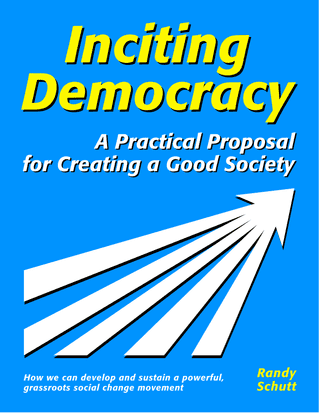
Inciting Democracy: A Practical Proposal for Creating a Good Society
Questions and Concerns
A. Is It Possible to Create a Good Society?
 Back to Questions and Concerns Table of Contents
Back to Questions and Concerns Table of Contents
1. It Seems Too Good to be True
Your good society sounds like some kind of unreachable fairyland. Are you trying to create a perfect world?
No matter how wonderful society might eventually be, I am sure there will always be many problems. Human beings will continue to be born with physical deformities. People will still get sick, have accidents, and incur injuries. Lightning will continue to strike, floods will inundate us, earthquakes will shake us, and tornadoes and hurricanes will ravage us. Moreover, people will continue to make mistakes and accidentally hurt others. They will also continue to disagree and get angry at each other. Even if people could act their best, we will still invariably hurt one another. I do not believe there is any way to abolish these aspects of life and achieve perfection. If we ever could, our lives would probably be very boring.
In the long run, men hit only what they aim at… they’d better aim at something high. — Henry David Thoreau
However, I believe our society could be vastly better than it is now. Some people routinely act in caring, cooperative, and responsible ways that nourish those around them and promote a supportive society. If most people behaved this way instead of just a few, our society would be tremendously better. Gone would be most of the current strife and repression of human spirit. Without all this human-imposed suffering, I believe joy and a sense of solidarity with others could be as common as hopelessness and alienation are now.
 Back to Questions and Concerns Table of Contents
Back to Questions and Concerns Table of Contents
2. Is Perfection Required?
In your good society don’t you assume that everyone would be perfect?
I assume only that most people would be in reasonably good psychological shape — as emotionally healthy and capable as many people are now. People could still make mistakes, and they could still occasionally be irrational and hateful. However, I assume that most people would be rational and compassionate most of the time. I assume they would be able to rebound from depression or hurt quickly in the same way many people can now.
Aim for excellence, not perfection. — Proverb
 Back to Questions and Concerns Table of Contents
Back to Questions and Concerns Table of Contents
3. Must People Change Their Personalities?
How do you expect to change people’s personalities?
I do not believe that people have rigid, unchangeable personalities. My own feelings and reactions change drastically from day to day depending on the situation in which I find myself. When surrounded by gentle, loving people, my tender side comes out. When attacked, hurt, or stifled, I am more defensive and surly. When I walk in the woods on a beautiful day, watch a heart-touching movie, or have a good cry with a loving friend, my heart opens with joy and compassion. When threatened by authorities, thwarted by obstinate bureaucracy, scorned by friends, or impeded by poorly designed technology, I usually become angry or withdrawn. Encouragement boosts my intelligence and creativity. Ridicule lowers my responsiveness and self-esteem. I assume that circumstances affect other people in these same ways. If so, then a good, compassionate society would bring out the best in all of us and make it much easier to create and maintain a good society.
I also assume people would be more capable and compassionate if they were not raised in poverty, pushed around by alcoholic parents, sexually abused, raped, or battered by adults, taunted and humiliated by their peers, forced to go to war by the government, and in other ways traumatized as they grow up. I further assume that caring support and good emotional therapy would help them to become less neurotic and more resilient.
 Back to Questions and Concerns Table of Contents
Back to Questions and Concerns Table of Contents
 The Vernal Project
The Vernal Project 